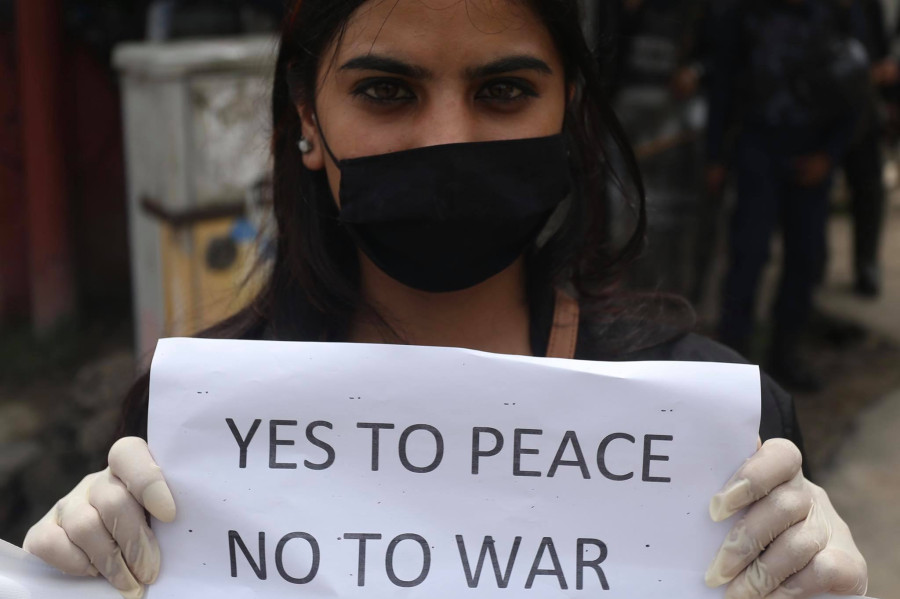National
Diplomatic talks with India unlikely in the aftermath of the clash between India and China
With India’s attention focused on China following a violent altercation at the border, boundary talks with Nepal unlikely to take place soon, say analysts.
Anil Giri
Days after a fatal clash between Indian and Chinese troops in the disputed Galwan Valley left at least 20 Indian soldiers dead, the world continues to closely follow developments. Nepal has significant interests of its own in a peaceful diplomatic solution to the tensions, but it also has its own border disputes with India and any hope of resolving the issue early through diplomatic talks might just have vanished, say analysts.
Strategic experts and former ministers believe that India will likely focus all of its attention on first settling the dispute with China, which will lead to Nepal’s demands for talks falling by the wayside.
Nepal has been asking for talks to resolve boundary issues ever since India released a new political map in November showing Kalapani as part of its territory. Again, in early May, India opened a link road via Lipulekh, leading Nepal to issue a map of its own that includes Limpiyadhura, Lipulekh and Kalapani, all territories contested by India.
After Nepal’s House of Representatives passed an amendment to the constitution to formally induct the new map into the national emblem, India had “noted” developments and pressed its own claim. Even as tensions were rising between Nepal and India, the violent clash in eastern Ladakh took place on Monday.
And compared to the nature, severity and magnitude of the boundary dispute between India and China, the troubles between Nepal and India are not as serious or complex, say analysts.
“India will probably not conduct diplomatic talks with Nepal while scuffling with China over a territorial dispute,” said Geja Sharma Wagle, a strategic analyst who writes frequently on security matters. “This, however, is a sign of India’s diplomatic failures with both Nepal and China. Unless India realises this, there will be no dialogue anytime soon.”
Relations between India and Nepal have perhaps reached their lowest point since the 2015 blockade of Nepal, said Wagle. Political rhetoric had flown from both sides and even people-to-people relations appeared to hit a significant low. But the clash with China has displaced brewing animosity towards Nepal.
Given Nepal’s close relations with India, including the presence of thousands of Nepalis in the Indian Army and a treaty of peace and friendship, any conflict that involves India could result in a very complicated and sensitive situation for Nepal, Wagle said.
But Prime Minister KP Sharma Oli appears confident that talks with India will take place “very soon.” On Thursday, the National Assembly passed the constitutional amendment, which was swiftly endorsed by President Bidya Devi Bhandari.
“As soon as the President authenticates the new updated map, the process of constitution amendment is over and talks with India will move ahead,” Oli told reporters after an address in the upper chamber.
So far, all India has said in response to Nepal’s demands for talks is that diplomatic talks can only take place after the Covid-19 pandemic subsides.
But there is no reason why talks cannot be held simultaneously with both Nepal and China, say some ruling party leaders and government officials.
“Yes, we understand the seriousness on the other side of the border but I do not see any reason not to sit for talks with us,” said Rajan Bhattarai, Oli’s foreign relation’s adviser. “We are already employing various back-channel sources to create an environment conducive to talks.”
Bhattarai did not elaborate on what back-channel sources the Oli government is using to reach out to New Delhi.
If India can hold talks with Nepal at this moment, it will send a message that India’s “neighbourhood first” actually works and will contribute positively to India’s standing in the region, said a ruling party leader who did not wish to be named citing the sensitivity of the unfolding events.
“But with the nature of the dispute between India and China getting serious, Nepal will find it difficult to get on New Delhi’s foreign policy radar,” he said. “With the way some in the Indian media are stoking the dispute, public opinion towards Nepal is also very low and any positive outcome is unlikely.”
Some foreign policy wonks in Kathmandu believe that Nepal is caught between a rock and a hard place, due to its own inability to take serious diplomatic initiatives but also due to India’s intransigence in sitting for talks. Even if talks with India may not be possible immediately, Nepal can utilise this time to do its homework and prepare its ground, say analysts.
Ramesh Nath Pandey, a former foreign minister, believes that Nepal needs to abandon politics and embrace diplomacy.
“It is unfortunate to say that diplomacy has been bypassed when it should be in the driver’s seat,” said Pandey. “We have a serious trust deficit with both neighbours and this can be restored by serious talks. There is no alternative to talks, but I do not see a proper environment at this moment.”
India’s disputes with Nepal are small when compared to its border issues with China or Pakistan, say analysts, which is why it needs to work on resolving them sooner and preventing them from turning into bigger headaches. If India allows the dispute with China to overshadow talks with Nepal then it will only cement the perception that India is not interested in speaking to Nepal, said Indra Adhikari, a research fellow at the Policy Research Institute.
“India should realise that small irritants with its neighbours are not favourable to its peaceful rise as a global power,” said Adhikari. “India’s dispute, engagement, disagreement and conflict with China is different from ours. So as a responsible nation and an aspiring global power, India should resolve its small frictions with its neighbours and move ahead.”




 8.54°C Kathmandu
8.54°C Kathmandu















